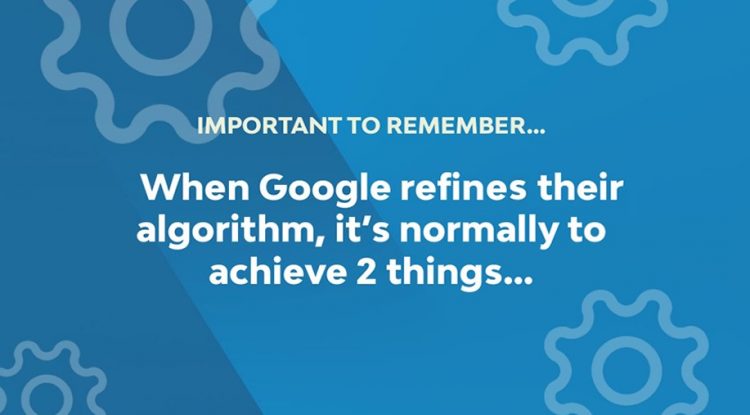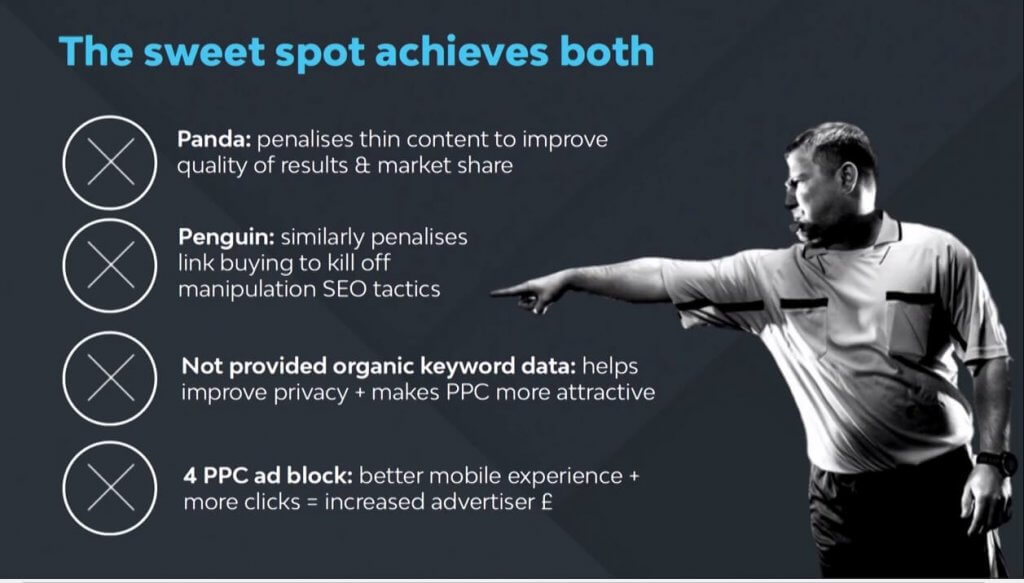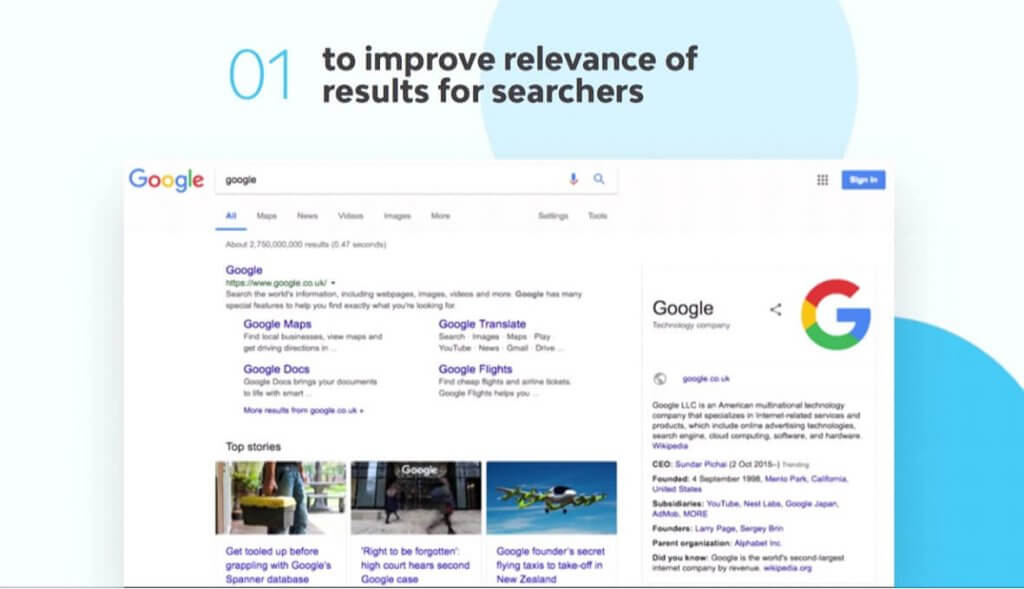What Is the Future of Search Engines: How to Conneсt the Dots Correctly
How many people use Google every day?
According to statistics from internetlivestats.com, Google now processes over 40,000 search queries every second on average, which translates to over 3.5 billion searches per day and 1.2 trillion searches per year worldwide. That’s tremendously impressive. In other words, it is a huge customer acquisition channel for many businesses.
Will it be so popular in the future? What will search look like in 15 years? How to get your site on Google first page?
No one can say for sure. But, let’s analyze the facts and trends in search to try to get a clearer picture.
To get an idea of what latest SEO trends will rock the industry in the future, you need to have a solid understanding of what people have been doing over the years.

We’re in the Information Age. You are sure to find virtually everything you are interested in on the web.
People use Google and other search engines to get the information they need. It’s pretty crazy if you compare our current state to the possibilities and technologies that were available in the 90s.
Yes, links are still important. However, linkbuilding is not a magic pill that guarantees you the results you want on its own.

Everything Is Constantly Changing, Google Included
Things are constantly changing. With modern technologies, they are changing even faster. What worked a few months ago doesn’t work today in terms of achieving SEO results.
Google is constantly improving their algorithms to deliver a better user experience for searchers.

What Is the Future of Search Engine Optimization?
Well, it’s all about awareness! If you understand why Google is making these changes, you’ll get a clear picture of where it’s all going.
So, why does Google launch its updates? There are 2 main reasons.
To Improve Relevance of Results for Searchers
Search results today look very different from the way they did years ago. Now, if you enter “Google”, you’ll see:
- Site listings
- Top stories and images
- Knowledge Graph results
This search engine is constantly changing and evolving.
To Make More Money
In the early days, the team at Google was trying to create the best search results possible. They still are.
However, Google shareholders have a lot at stake. Every decision made is more important for them from a financial point of view.
Thus, they make changes to get the search results more relevant and to generate more money and higher profits for their shareholders in the future.
The Truth Behind Google Latest SEO Updates: Unleash the Future by Analyzing What’s Happening Now

The sweet spot achieves both. You can’t just try to make more money and expect to be #1 in the market. You should deliver for your customers first.
Panda penalizes sites with low-quality content. On the one hand, it improves the quality of SERP. On the other hand, if the quality of results is high, Google will get more market share. Users get more of what they want to see from searches.
Penguin penalizes old-school linkbuilding tactics. As a result, it stamps out manipulation search engine optimisation tactics. This is certainly driven by wanting to clean up Google search results; that’s the main reason for this update. This search engine wants to see the brands at the top. The idea is that big brands have the best content, which deserves to be at the top. It helps provide a better experience for users. Consequently, it maintains their market share.
Not providing organic keyword data helps improve privacy. It also makes PPC more attractive.
It encourages more people to use PPC in order to gain access to more PPC data and the stats that are coming through for their keywords.
4 PPC ad block provides a better mobile experience. However, it increases advertiser income. Google has to balance the two. You need to keep this in mind when it comes to creating and fine-tuning your SEO strategy.
What’s New in SEO? Where Is the Focus on SEO Today?
It is now more valuable than ever to get Technical SEO right. On the other hand, it is hard and complex, factoring in crawling, page speed, secure service, and internationalization. If you do all the technical things correctly on your site, you’ll see a lot of benefits.
Ideas are a new currency. That’s especially true when it comes to modern linkbuilding methods. This is where you need to create real value. If you leverage some of these modern strategies, you’ll find this is a far stronger approach than legacy linkbuilding tactics. Let’s say you have a hundred articles and a hundred different links, with no relations to each other. This potentially looks like an SEO footprint.
If Google thinks that you’ve used SEO inappropriately to manipulate your position in search rankings, chances are the next time they do the algorithm update they will penalize you for this.
How to get a bright future for your project? If you have a great idea and a good story, which generates strong PR attention, getting links will be more natural. People will be likely to talk about you because you’ll have a story to tell. You should consider this technique if you’d like to get links in a smart and natural way.
Red Bull is a great example of this – they put someone in space. That’s a very extreme campaign. Links and SEO are obviously not the primary reasons they did it; great content comes first. You should leverage the value of PR reach, social engagement, traffic, awareness, and high-quality links at the same time. This combined approach puts you in a much stronger position.
You want to be in front of people wherever they are and provide them the best search results. Kevin and his team have done countless studies, testing title tags and meta descriptions not for standard optimisation but for click-through rates.
For example, if you hold ranking #8 in Google and generate a stronger click-through rate than the #5 position, you may rank more highly because users consider your site to be a more relevant result. The same applies the other way round. If your click-through rate is not high as it could be, the search engine might rank your site lower in the SERP.
The same also applies to engagement. If people get to your page or site but don’t like it, they bounce back out to the next search result. Google also understands this; it tells them that the site isn’t as good as it could be.
Thus, it’s crucial to make sure that your content is engaging and you are getting the most out of traffic from your click-throughs because Google is now a lot more sophisticated and smart than it once was.
Engagement has become a very important factor in terms of how it influences rankings. Probably it will remain in the future.
The Future of SEO Industry: Think About Where Google Wants to Go
Take a step back and look at what the Google team is doing today: Google+, Google glasses, self-driving cars.
Clearly, Google is not only about paid and organic search. Taking this into account, think about where they want to go.
In this way, you gain an understanding of how you should align yourself with those goals and maximize your results. No one wants to be in the position when they are scared of the next algorithm update. Ideally, you want to be in a strong position where you are looking forward to the next update because you have solid content and are ready to benefit from it. That way, when things change, you won’t be left behind. You are in a strong, stable position, rather than just chasing Google algorithms hoping for the best.
When Kevin started doing SEO in 2003, Altavista, Ask Jeeves, Lycos, and Yahoo were the most popular search engines. Now, that seems like ages ago – but it was just 15 years ago. If you look 15 years into the future, do you think Apple, Facebook, Google, Amazon, and Twitter will still be here?
We would tend to assume so. But if you look at where we’ve come from and how quickly things have changed on the web, we must admit that it’s very likely at least one of them won’t be there. Other companies and brands are likely to replace them. Everything is changing all the time. This is why you shouldn’t rely on one source of traffic. If this source of traffic disappears, you’ll be in a weak position. You should try to understand where you can be for the long term.
Bill Gates was asked an interesting question: “Who is he most worried about?” Everyone expected he would say Amazon, Google, or Facebook. These are the obvious answers. But he gave a different answer: it’s the guy in the garage, a person who’s working on something right now, that you don’t even know about. These guys are hungry. They have a passion. They don’t spend their days in board meetings. They use their time to focus on doing something differently. These are the ones that are likely to be the major players when you look 10 or 15 years ahead.
How Is This Related to the Future of Search?
Quite clearly, with time, the virtual landscape has changed dramatically. You should always try to look at users’ behavior and how it evolves. A decade ago, everyone strived for desktop optimisation.
Now, mobile has clearly taken over in terms of where a large percentage of traffic comes from. It’s not going to end there. You can do searches from your home voice device, your headset, or your fridge. It’s crazy how many things you can search from now. There were no such options in the past. And the evolution is more likely to continue.
Main Tendencies and Interesting Facts
It sounds crazy, and it’s not a standard idea to envision the future of websites like this. However, actually, this could happen. We already have results where you don’t need to click in order to find the answers you need. Featured snippets are a great example of this.
From the new SEO perspective, that’s really annoying. If you are #1, you may lose traffic overnight because Google has a new idea to experiment with. If you are a searcher, you don’t want 10 results. You want one right answer. This is potentially a good user experience.
At this stage, you should always look at what Google is trying to do. Other potential trends are:
- We’re no longer optimizing just for desktop search. We’re optimizing for everything!
- By 2020, 50% of searches are expected to be performed by voice search
- 3 million smart speakers are expected to be shipped in 2018, according to Canalys. The U.S. smart speaker market report from December 2017 showed Amazon Echo having 69% of the market share, while Google Home had 25%.
- Can we see the future of augmented reality in our everyday life? Absolutely! It’s expected to have 1 billion users by 2020.
- Right now, more than 543 start-ups are listed under this category on Angelist.
 Share This Graphic on Your Site
Share This Graphic on Your Site
Please include attribution to ContentAdore with this graphic.
<a href="https://contentadore.com/future-search-engines/">
<img src="https://contentadore.com/wp-content/uploads/2018/09/Future-of-SEO-new.jpg" title="Future of SEO - ContentAdore Infographics" alt="Image of Future of SEO - ContentAdore Infographics" width="540px" border="0" />
</a>
How to Win?
You have to balance these long-term trends and with what works today, but don’t be left behind completely. If you invest a small percentage of your effort into experimenting with future SEO techniques today, you are likely to see big returns. Always keep learning. Optimize for people, not for search engines.
Questions and Answers with Kevin Gibbons
I was lucky enough to have a chat with Kevin personally after his report. Here is a summary of it. I hope you’ll find it useful.
Me: One common tactic is to put 70% of your efforts into linkbuilding and 30% into content creation. What about you? Do you subscribe to this strategy?
Kevin: We put 70% of our efforts into content and 30% into link building because there is a different reason for creating content.
Me: Okay, great. From your experience, what is the average price for content, per 100 words? Assuming it is SEO content, articles that are for rankings in search, and it is the copy that sells.
Kevin: It varies. I think it depends on the quality of the content and what writer is behind it. As a general rule, I think it is around ₤50 per 100 words.
Me: As far as outreach is concerned, what approach do you prefer for your customers? I’ve just come across the article written by Brian Dean from Backlinko…
Kevin: Yeah, I know Brian.
Me: …Yeah, and he reveals the tactic that you should aim to create stories that will be interesting for top journalists and influencers. Then your outreach will be much easier.
Kevin: We have a media database. So, we know who the journalists are, their phone numbers, and their emails. We know how to contact them. Once we know them better, we try to pitch them content they’ll like.
We just phone them and ask: “What will you be working on next month?” And then we try to create the article around that subject. The key is to understand what the reporters want to see and create this kind of content.
Me: Great. Thank you. What piece of advice will you give as far as building such a list of top influencers? Because when you just start out, it is very difficult to reach out to top influencers. What ways do you recommend?
Kevin: Start small. For example, when we did outreach for our client in the fitness niche, we got coverage on the local fitness websites. Then we built social profiles. This person has written for these blogs. This is actually a social profile.
You can’t go to the New York Times and say: “Can we publish it?”. Instead, you should go to Men’s Health and say: “Well, we’ve written some stuff here. We think you would like it. Let’s see if we can publish it for your audience.”
And once you establish a good reputation, you approach Huffington Post or Cosmopolitan magazine, which is popular here. Rather than pitching for them straight away, you need to build a social profile first. It helps you get to the next level.
Instead of going from level one to ten, you should go to level two, then three, then four, and so on. It works for us.
Me: Ok, thank you. Do you use LinkedIn, Facebook, or Twitter for outreach?
Kevin: Twitter. Sometimes LinkedIn, but it’s not so good for this. There are a lot of people who send messages on LinkedIn. If someone’s received 20 messages, with one of them being your pitch for a story, they are likely to just ignore all of them. So, that’s harder. In general, people quite like to follow tweets. They don’t really like LinkedIn messages.
Me: Thank you. One more question.
Kevin: Sure.
Me: What strategies do you recommend for developing a brand? Is it better to start with a personal brand? If we take an SEO writing agency, is it better to develop a personal brand and then develop the brand of the agency? What do you think?
Kevin: That’s how I do this. I think people trust people.
Me: Yeah.
Kevin: So, when I say things in my own voice, I think it is more genuine. You still need a company brand, for sure. But I think the real relationships are established between people, not brands. It’s a bit different.
Me: What ways do you suggest to develop a personal brand?
Kevin: Blogging, speaking, Twitter, and LinkedIn. All of them, really. There should be blog posts and social updates. You start doing one thing and reuse it in a different way. If you take a presentation, you can reuse it as a slide-share, social update, email message.
Me: Thank you, Kevin.
Share your ideas on the latest SEO trends and how the future of SEO might look in the comments section below!
Stay tuned for more insights and tips from the experts on a regular basis. Subscribe now!



 (3 votes, average: 4.67 out of 5)
(3 votes, average: 4.67 out of 5)
I like a point about outreach via Twitter. It is really one of the most effective method for promotion and outreach. Not once, we have found Customers through Twitter. However it could be interesting referring other types of Social media channels you can put in the same line with Twitter? As I am aware, Facebook, Youtube, Instagram are quite effectiv as well. Whether these tools are still decent and what is your experience with it?
Julie, I like that you find this tip useful.) Yes, LinkedIn is also great tool for outreach. Other channels can be good as well.
Informative article referring to future of SEO, everyone should to know it. Particularily I like strategy of Kevin, such as “We put 70% of our efforts into content and 30% into link building”. For us it was 50/50, however I feel that I need to change our strategy little bit more. We are devoting a lot of time to Technical SEO, which is really important for well positioning.
Jose, I’m happy you like it). Thanks a lot.
Interesting facts, particularily I like information that by 2020, 50% of searches are expected to be performed by voice search. It would be great to know more referring to this, so I can adjust my website and SEO tactics in the right way. Voice search could be possibly even more efficient, what do you think? Do you think that voice search can possibly totally substitute today’s search and which possible conclusions we should be waiting for?
Judy, yes this can happen. More and more users tend to use voice search instead of traditional search. That’s why we should start optimizing our site and pages in such a way so that the users can easily find them via voice search.
Great info i just like to add here how you see the future of digital marketing agencies as google and other are moving toward automation and AI is major role in the future and these are eliminating the important and big question for the survival of these agencies and what your view on this.